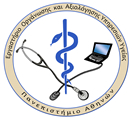Syphilis
|
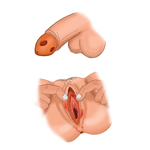 1. One or more (usually painless) round, small sores on the genitals or anal area, in the mouth or elsewhere 1. One or more (usually painless) round, small sores on the genitals or anal area, in the mouth or elsewhere
|
|
|
|
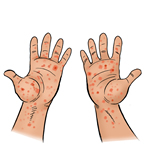 2. Disseminated rash on the palms of the hands and the soles of the feet or elsewhere on the body 2. Disseminated rash on the palms of the hands and the soles of the feet or elsewhere on the body
|
|
|
|
 3. Tiredness 3. Tiredness
|
|
|
|
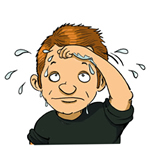 4. Fever (this is rare) 4. Fever (this is rare)
|
|
|
|
 5. Headache 5. Headache
|
|
|
|
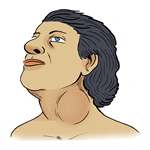 6. Swollen lymph nodes, e.g. in the neck, the armpits 6. Swollen lymph nodes, e.g. in the neck, the armpits
|
|
|
|
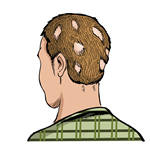 7. Loss of hair (rarely) 7. Loss of hair (rarely)
|
|
|
|
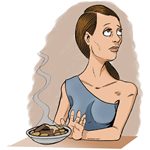 8. Weight loss (rarely) 8. Weight loss (rarely)
|
|
|
|
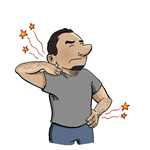 9. Joint pain (rarely) 9. Joint pain (rarely)
|
The symptoms develop within 10-90 days (usually 21 days).
Transmission
Not all people with syphilis have symptoms so you may not know you have it. Syphilis is spread:
-
Through close contact with an infected wound i.e. when your mouth, genitals or other part of your body touches the wounds of a person infected with syphilis. It is usually transmitted through sexual contact (anal, vaginal, oral) with an infected partner
-
By sharing razors, needles, syringes
-
From a mother to her baby during pregnancy
Treatment
In order to treat syphilis, seek medical help. In the early stages it is treated and cured easily. If left untreated, it could result in severe health problems, causing damage to the heart, brain, eyes and other organs (4th stage). Syphilis is treated with antibiotics. Treatment does not mean that you cannot be re-infected. Avoid close physical contact with other persons until your treatment and the testing/therapy of your sexual partner are complete. If you are diagnosed with syphilis, it is important to inform all your recent sex partners so that they get tested and receive treatment.
Prevention
-
Avoid having sex or have a mutually monogamous relationship with a partner who has been tested and is not infected
-
Always use a condom properly in any kind of sexual intercourse, from start to finish, with any sex partner. The condom protects only the areas covered!
-
Avoid re-using syringes
-
Talk sincerely and openly with your partner regarding syphilis and other sexually transmitted diseases
When to seek medical advice
You should see your doctor if:
-
You develop symptoms, such as a painless small red wound on your genitals or your mouth
-
Your partner has syphilis or symptoms that could be associated with syphilis, even if you do not have symptoms
References
keelpno
nhs
cdc















